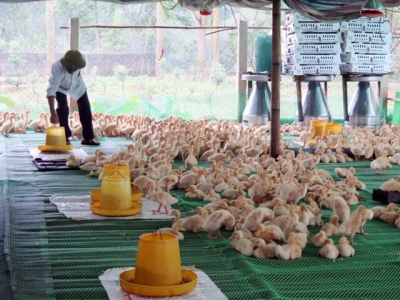Biosecurity in livestock production increases survival rate to 95%

Taking part in cooperative groups along with the adoption of biosecurity measures in livestock production has increased survival rate of raised animals to 95%.
Biosecurity in livestock production brings stability and economic efficiency to breeders. Photo: Dong Van Thuong.
Nguyen Thi Ly, leader of a cooperative group in Hiep Hoa village, Phu Ly commune, Phu Luong district, Thai Nguyen province, said with the aim at creating production linkages and promoting consumption of livestock products, Hiep Hoa cooperative group was established on the basis of gathering large-scale farming households in the area. Since its formation, the cooperative group has organized many training courses to provide technical support to its members.
With quality commitment to consumers to serve them with the best products possible, their products could be put up for sale in supermarkets, groceries and cafeteria across the province.
Nguyen Van Loan, a member of Hiep Hoa cooperative groups, said chickens here were raised naturally and the breeders vaccinated their chickens only once when they were newly-hatched chicks.
During the rest of chickens' life, the chickens were treated with garlic instead of antibiotics to prevent diseases. When the chickens were one and a half month old they were released into the garden to develop muscles. The breeders in the cooperative group have tried to create habitats like nature for their animals.
Especially, chickens would be checked for quality by the officials of the Sub-Department of Quality Management of Thai Nguyen province and traders before being sold out. Until now there have been no orders cancelled because of low quality. On top of that, the breeders could sell their chickens for the prices above the market thanks to signing contracts and sale agreements.
According to Vi Van Thai, leader of a biosecurity cooperative group in Dong Dat commune, Phu Luong district, biosecurity in poultry production is in fact the application of integrated and synchronous technical and safe management measures to prevent the contact between poultry and pathogens, improve animal health and create disease-free conditions. Thus, the breeders in the cooperative have been using water from bore wells for bathing ducks.
Being a member of a cooperative group has brought many benefits to farming households of which the focus is improving economic efficiency and aiming at sustainable livestock development. In the past, Thai's family let their livestock graze freely. It was hard work and he couldn't control and prevent diseases effectively, resulting in low survival rate (at 70-85%). Since he adopted biosecurity approach the survival rate has reached 95%.
Currently, Thai Nguyen is home to approximately 15 million poultry. Raising poultry here is changing into concentrated commodity production on farm scale, mainly in key poultry breeding areas. With more than 400 poultry farms, a number of linked chains from breeding, slaughtering, processing to consuming have been established.
Vu Duc Hao, Deputy Director of the Department of Agriculture and Rural Development of Thai Nguyen province said in order to increase the efficiency of poultry production with the adoption of biosecurity measures in association with consumer consumption, the Department will continue to act as a counselor, direct the implementation of mechanisms, policies and encourage enterprises to invest in livestock production as well as slaughterhouses.
Along with that, it will continue to attach great importance to the development of supportive policies related to animal disease prevention and control, organizing production in value chain. In addition, it will continue to develop and complete additional policies to promote commodity production by supporting breeders and removing land use barriers to arrange concentrated livestock areas in the province.
Besides, Thai Nguyen's agricultural authority also is planning to introduce advanced technologies to livestock production to create safe and high-quality commodities. Another focus of the province's competent agency is supporting deep and hi-tech processing and adopting food preservation techniques in addition to building brand and promoting products as well as establishing linkages between production and consumption of livestock products.
Last but not least, the department will continue to pay attention to the relocation of concentrated livestock farms which do not meet the requirements of veterinary and environment hygiene along with improving surveillance capacity and efficiency in disease prevention and treatment, preventing emerging infectious disease and stopping the spread of dangerous animal diseases in the province.
Related news
 Eight solutions to improve agro-product quality and market
Eight solutions to improve agro-product quality and market In order to improve the quality and expand the markets for agro-products consumption, Ameii Vietnam JSC has proposed eight proposals.
 Agriculture following the 'green trajectory'
Agriculture following the 'green trajectory' It is necessary to aim for 'green values' created from 'green transformation', 'green consumption', and 'green economy'.
 Strategies and policies to enhance Vietnamese agro-products' value
Strategies and policies to enhance Vietnamese agro-products' value Answering the question of how to enhance Vietnamese agro-products' value, we should first realize that we are lacking major strategies and policies.